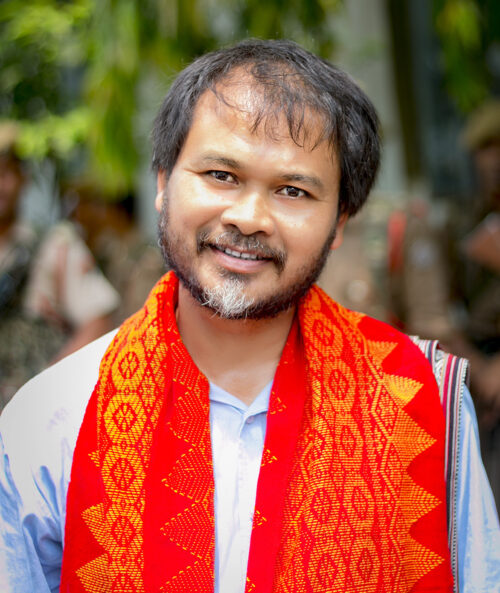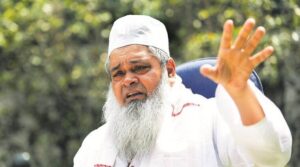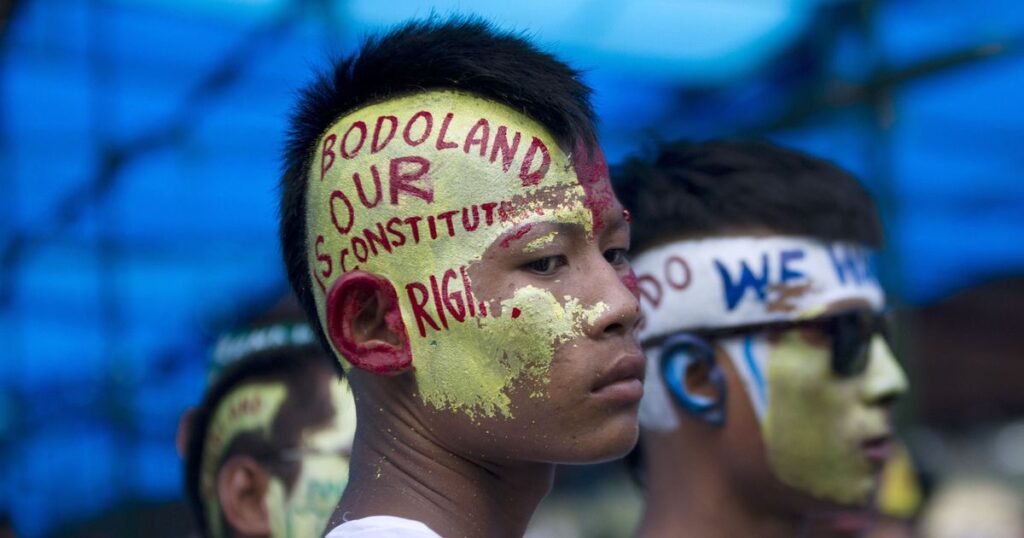Like the dynamic riverine landscape of Assam that changes every monsoon, Assam ahead of her state assembly election presents a different scenario every day. As the first rounds of nominations were filed on March 10, three distinct political camps have emerged with friendly contests across the political spectrum in 126 constituencies. The elections will take place over three phases starting from March 27 till April 6.
The people of the state went through a turbulent time recently with the Assam Government under the monitoring of the Supreme Court of India conducted the National Register of Citizenship exercise over a year preparing a list of 1.9 million people, deeming them as non-citizens. This was followed by a widespread anti-Citizenship Amendment Act movement across the state which led to the deaths of at least five young protesters and arrests of peasant leaders like Akhil Gogoi by the National Investigative Agency (NIA).
The anti-CAA movement left its mark on the political landscape of the state. In the backdrop of a lockdown hurriedly imposed over the country, two political outfits, Raijor Dal and Asom Jatiya Parishad (AJP) emerged hoping to channelize the anger of anti-CAA agitation to overthrow BJP-AGP combine. Raijor Dal emerged from 70-odd organizations working with marginalized communities who had led peasant and land rights movements across the state. On the other hand, Lurin Jyoti Gogoi, the former secretary of Assam’s most important student organization, All Assam Students’ Union (AASU) with the help of former Asom Gana Parishad leaders who quit the party in the wake of the anti-CAA agitation.
Also read: Defeat the Karnataka Society (Amendment) Act That Robs off the Rights of Minorities: PFI

Akhil Gogoi, leading Raijor Dal from Guwahati Central Jail filed his nomination from the Sivasagar seat in Upper Assam. Akhil’s cadres went around the state collecting donations to field the candidates across the state, even as the party could not get registered before the poll nominations started. Raijor Dal candidates will be contesting independently. Compared to Raijor Dal, AJP started putting up large advertisements way ahead of elections across Assam.
Two new formations, however, did not come together with Congress (I) led Anchalik Gana Morcha (Regional Democratic Front) coalition despite several appeals from various sections of Assamese civil society to have one united opposition to challenge BJP after bringing the controversial Citizenship Amendment Act. Raijor Dal and AJP stayed away from the Congress-led alliance as one of the constituents would be All India United Democratic Front (AIUDF) led by Badruddin Ajmal, a powerful businessman and the Lok Sabha Member of Parliament from Dhubri. Along with AIUDF, the Left parties also joined the Congress-led coalition.

The incumbent BJP-AJP alliance, on the other hand, went on an offensive against the Congress-led alliance accusing it of joining hands with AIUDF, often regarded as an outsider in Assamese politics because of widespread support from the Bengali Muslim populace. AIUDF, on its part, has used the NRC process and its discontents as the cornerstone of its campaign with a host of issues faced by people in riverine island habitats of lower Assam. Himanta Biswa Sarma, a senior leader and a Cabinet Minister in the incumbent BJP-AGP government who jumped ship from Congress to BJP in 2015 ahead of the previous assembly election has made several appeals to the voters not to elect AIUDF. In several meetings during the run-up to the Assembly elections of 2021, he said that Assam would be run by ‘foreigners’ and ‘Bangladeshis’ if the Congress-led coalition was elected to power. Incidentally, Sarma and colleagues in AGP maintain that CAA is not an issue nor is the NRC process.
Curiously, Raijor Dal also faced criticism from intellectuals such as Hiren Gohain, known for his critique of the Assam movement of the 1980s, for not joining the Congress alliance. Gohain resigned as an advisor to the party earlier in February just after Akhil Gogoi in a letter from the Gauhati Central Jail decided to stick to the alliance with AJP by not joining the Congress-led alliance.
Also read: How to Fight Fascists? : Farmers’ Movement Shows the Way
On the other hand, BJP-AGP and National Democratic Alliance’s former partner, Bodo People’s Front (BPF) led by Hagrama Mohilary switched sides and came into an understanding with the Congress-led alliance. BPF had emerged from a prolonged struggle to create a home for Bodo people, a Tibeto-Mongoloid tribe mostly concentrated across the length of the North bank of Brahmaputra. Hagrama led an armed struggle with his outfit, Bodoland Liberation Tigers, against the Indian government till 2003 when NDA 1 led by former Prime Minister, Atal Bihari Vajpayee signed a new accord paving the way for the Bodoland Territorial Council.

As Hagrama became the Chief Executive Officer of the newly formed Bodoland Territorial Council in 2003 after an election, All Bodo Students’ Union(ABSU), another powerful organization from the region, soon renewed their demand for a separate state under Indian Union. In 2020, Amit Shah, Union Home Minister brought a new record to cull the demand for statehood by giving more powers and more independence to the existing Bodoland Territorial Council. The new accord is considered historic with the National Democratic Front of Bodoland, a separatist outfit laying down their arms before the government.
ABSU led by Pramod Boro, a student leader became the president of United Peoples Party Liberal, a considerably new outfit in the political landscape of Bodoland, ahead of the BTC polls. As Mohilary-led BPF could not come into an agreement for seat-sharing with BJP ahead of BTC polls in December 2020, BJP found UPPL as the new ally. Despite having three ministers in the State Cabinet, Mohilary on February 27 announced that he would join the Mahajot. BPF continues to remain as the single largest party in BTC and holds a fair share of the votes from Bodoland in both State Assembly as well as BTC. BPF joining hands with a Congress-led alliance which includes AIUDF has brought two polar opposites together as Bodos and Bengali Muslims have shared a violent past in previous decades.
Also read: West Bengal Elections: Can the fragmented opposition take advantage of the ongoing Farmers Movement
Among the other political outfits, Ganashakti, a party with a base in the North bank of Brahmaputra in Upper Assam that won elections for BJP on both Panchayat and State Assembly level has merged completely with BJP. Lone MLA from Jonai seat close to Assam and Arunachal Pradesh border, Bhuban Pegu joined BJP. While Ganashakti, a party formed to give marginalized tribal communities a voice still has elected members of local panchayat, the formation would be missing from the State Assembly Elections.

While three coalitions have fielded several candidates in friendly contests across constituencies, Assam is also witnessing the rise of independent and issue-based election campaigns. Although Congress-led alliance has extended its hands to candidates such as Pranab Doley, contesting against AGP president and State Agricultural Minister, Atul Bora, largely remains independent. With an aim to form solidarities with marginalized Adivasi communities employed big tea gardens and flood-affected Scheduled Tribe and Scheduled Caste population, Doley has been supported by villages growing food crops to fund his political campaign. Arguably, this kind of support has not been seen among other candidates, even large sections of the Assamese society remain sympathetic to Raijor Dal and AJP candidates.
May 2 will decide the fate of all the coalitions contesting these elections where ground-based issues have hardly found any takers. The manifestos are full of promises but campaigns are more on identity lines across the state. In such a polarised atmosphere, figures however indicate that both BJP and Congress have a vote share of only 36 percent up until 2019 across various Panchayat, autonomous council, and municipal elections, as per Election Commission of India’s data. If one looks at the vote share of present constituents of Congress-led coalition it is 48 percent while BJP and the constituents have 38 percent.




[…] ಏಪ್ರಿಲ್ 2 ಮತ್ತು 3 ರಂದು ಸಿಂಘು ಗಡಿಯಲ್ಲಿ ಕಿಸಾನ್ ಪ್ರೀಮಿಯರ್ ಲೀಗ್ ಆಯೋಜನೆಗೊಂಡಿದೆ. ಅಮೆರಿಕನ್ ಸಿಖ್ ಸಂಘಟನೆ ನ್ಯಾಷನಲ್ ಶೂಟಿಂಗ್ ಬಾಲ್ ಚಾಂಪಿಯನ್ಶಿಪ್ ಆಯೋಜನೆ ಮಾಡಿದೆ. ಪ್ರತಿಭಟನಾ ಸ್ಥಳ ಸಿಂಘು ಗಡಿಯ ಪಾರ್ಕರ್ ಮಾಲ್ ಬಳಿ ಪಂದ್ಯಗಳು ನಡೆಯಲಿವೆ. […]
[…] Also read: Assam elections: A battle of alliances […]
[…] Also read: Assam elections: A battle of alliances […]
[…] Also read: Assam elections: A battle of alliances […]
[…] Also Read: Assam elections: A battle of alliances […]